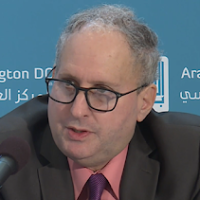U.S.-Iran Reconciliation Under President Rouhani? (held at Atlantic Council)
The inauguration on August 4, 2013 of Hassan Rouhani has raised expectations for progress, nearly 34 years after the United States broke diplomatic relations with Iran. Panelists discussed President Rouhani and his cabinet, the amount of leeway they are likely to receive from Supreme Leader Ayatollah Ali Khamenei, the prospects for U.S.-Iran reconciliation in the aftermath of Iran’s presidential elections, and possible solutions to the nuclear impasse.
On September 12, the South Asia Center of the Atlantic Council and the Middle East Program of the Woodrow Wilson International Center for Scholars held a meeting at the Atlantic Council with Haleh Esfandiari, Director of the Middle East Program; Robert Einhorn, Senior Fellow at the Brookings Institute; and Kenneth Katzman, Specialist for Middle East Affairs at the Congressional Research Service. The event was moderated by Barbara Slavin, Senior Fellow at the South Asia Center at the Atlantic Council.
Esfandiari started off the discussion by describing the contrast between President Hassan Rouhani and former Iranian President Mahmoud Ahmadinejad. Esfandiari described Rouhani as an “insider” and a skilled politician, whose government signals a return to normalcy in Iranian politics. Rouhani has been described as a moderate and a reformer, but also as a pragmatist who is open to dialogue with the United States. Unlike his predecessor, he appears to be serious about negotiating the nuclear issue and is open to making compromises. Esfandiari stressed that while Rouhani may deliver in terms of foreign policy, he must also deliver on domestic issues. For the majority of Iranian people, tackling domestic economic problems and easing social restrictions takes precedence over nuclear issues. Esfandiari continued, that even if strides are made towards U.S.-Iranian reconciliation, Rouhani must explain to the Iranian people that sanctions will not disappear overnight. She concluded by saying, “the international community must give Rouhani time and help him show that moderation produces results.”
Einhorn’s remarks focused on U.S.-Iran nuclear issues. The previous Iranian administration thought that they could weather the sanctions – even claiming that sanctions were “good” for Iran – and resisted all compromise in bilateral discussions. However, Einhorn described Iran’s new government as more realistic, as Rouhani realizes that the economy cannot be fixed without major sanctions relief, and that will not be possible until Iran moves forward with its nuclear negotiations. Einhorn believed that there is a prospect for genuine negotiation with Iran at this time. On the other hand, he cautioned that this does not mean the likelihood of success will be high. Iran’s main goals would be to 1) get sanctions removed; 2) ensure that their rights to enrichment for peaceful purposes are respected; and 3) pay the smallest price for their future nuclear prospects. Einhorn noted that Rouhani has already successfully launched a public diplomacy campaign by extending a Rosh Hashanah greeting via Twitter, agreeing to meet with the IAEA, and condemning the use of chemical weapons in Syria. Thus, Rouhani has taken steps toward preparing a more flexible and less-hostile environment for negotiations.
Katzman discussed the impact of sanctions on Iran’s economy. During his campaign, Rouhani ran on a platform of easing sanctions. Thus, it could be argued that the United States’ sanctions were “working”, because Rouhani has taken a more moderate approach to engaging with the West. Katzman described the ways in which the Iranian economy has suffered as a result of sanctions, noting that there has been a 40 percent drop in revenue from oil exports and that other countries have made “significant” cuts in purchases of Iranian oil in order to avoid U.S. penalties. However, Katzman noted that the United States has already eased sanctions on humanitarian-related activities by NGOs in Iran and on athletic exchanges between the United States and Iran. Thus, in response to Esfandiari, he argued that some sanctions can be reduced by executive order, which may pave the way for more goodwill between the United States and Iran.
By Samaa Ahmed, Middle East Program
Speakers

Senior Fellow, Atlantic Council's South Asia Center and Washington correspondent for Al-Monitor.com

Hosted By

Middle East Program
The Wilson Center’s Middle East Program serves as a crucial resource for the policymaking community and beyond, providing analyses and research that helps inform US foreign policymaking, stimulates public debate, and expands knowledge about issues in the wider Middle East and North Africa (MENA) region. Read more
